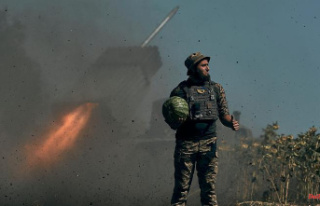Economics Minister Habeck met with great rejection from the opposition and environmental organizations with his nuclear power plant plans. For some his plans go too far, for others not far enough. Only the coalition is encouraging - if not from everyone.
For his decision to keep two nuclear power plants connected to the grid as electricity reserves until April 2023, Federal Economics Minister Robert Habeck has received severe criticism from outside his own ranks. While the Greens assured their support, the Union described the project as a fatal mistake, and environmental groups were outraged. The coalition partner FDP also reacted cautiously.
The parliamentary manager of the FDP parliamentary group, Johannes Vogel, wrote on Twitter: "It is a matter of common sense to now enable every climate-neutral kilowatt hour." But he added: "Habeck's emergency reserve is a step, but also appears as a political emergency exit." The FDP stay tuned: "For the continued operation of the 3 nuclear power plants!"
However, support came from the coalition partner SPD. Group Vice President Matthias Miersch welcomed the stress test result and Habeck's recommendation as "a good basis for fact-based and careful advice". "I would also like to see the same from those who are already clamoring for a runtime extension before the results are announced," said Miersch. "The stress test shows: Atom is not the general solution that many people want."
According to Habeck, two of the last three German nuclear power plants after the turn of the year should be available as an emergency reserve until mid-April 2023. The stress test for the security of the power supply shows that the Isar 2 power plants in Bavaria and Neckarwestheim in Baden-Württemberg can, if necessary, make an additional contribution to the power grid in southern Germany in the winter of 2022/23.
The top of the Union faction described the decision of the Green Economics Minister as partisan politically motivated. "In this crisis, these three nuclear power plants could deliver energy and electricity for Germany safely, reliably and affordably. And they should continue to do so for at least the next two winters," said Jens Spahn, deputy leader of the Union faction. The Greens "prefer to switch off climate-neutral nuclear power plants and, if in doubt, let the climate killer coal run longer. This means that the Greens' ideology takes precedence over the interests of our country."
CDU leader Friedrich Merz also called for the continued operation of the three nuclear power plants still on the grid and described classifying the reactors as an emergency reserve as completely insufficient. "Full performance of these power plants on the grid and on the market," he said. The government must also order new fuel rods so that the nuclear reactors can run for another three to four years. The electricity is urgently needed.
CSU boss Markus Söder described Habeck's decision as "a decision against all reason and to the detriment of our country". The Bavarian Prime Minister wrote on Twitter: "Robert Habeck accepts the risk of a blackout and further increases in electricity prices."
Federal Environment Minister Steffi Lemke, meanwhile, supported her party colleague's decision. "In view of the difficult situation, Robert Habeck's suggestion to have reserve capacity for emergency operations is reasonable," explained Lemke, who is also responsible for reactor safety. This would not extend the lifetime of the nuclear power plants, and at the same time a responsible solution for ensuring energy security would be made for a worst-case scenario. Ensuring safety is always the top priority. Support for Habeck also came from the two chairmen of the Green parliamentary group, Britta Haßelmann and Katharina Dröge.
The anti-nuclear movement actually belongs to the roots of the Green Party. She had fought vehemently against term extensions in recent years. Environmental groups were therefore outraged by Habeck's plans. "With his decision to reserve reserves for two nuclear power plants, the Green Federal Minister of Economics, of all people, is giving up a hard-won social consensus," criticized Greenpeace Germany boss Martin Kaiser. "Keeping nuclear power plants available beyond December 31 is unacceptable and prevents the necessary energy transition - especially in southern Germany."












